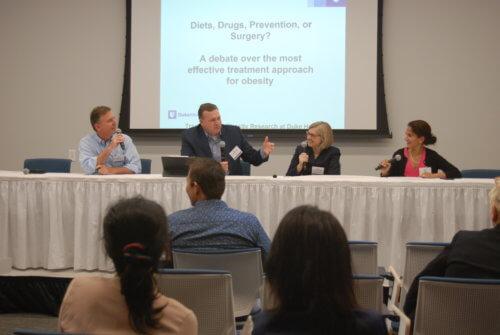
Over 100 researchers, clinicians, community members, and patients came together to spotlight obesity-related research during the Transforming Obesity Research at Duke Symposium, which was co-hosted by the DCRI on June 21.
Attendees gathered at the DCRI to foster new collaborations and bolster opportunities for meaningful research, as well as to address causes of obesity, barriers in patient care, and treatment methods for the disease.
“It is interesting to see how many people at Duke are studying obesity, looking at it through their own perspective, but unaware of the other experts both at the university and within the community,” said the DCRI’s Sarah Armstrong, MD, associate professor of pediatrics, who co-hosted the symposium along with Matthew Roe, MD. “Each of them is examining [obesity], but through very different lenses.”
The day-long program included presentations, panel discussions, a debate, and breakout sessions. The DCRI’s Joseph Rogers, MD, chief medical officer of the Duke University Hospital System, provided the morning keynote highlighting the complex nature of obesity, rates across the U.S., and the shift in thinking that needs to occur to result in meaningful change.
Rogers’ call-to-action was an overarching theme of the symposium that carried into the patient perspectives panel, which introduced the attendees to six patients with the lived experience of obesity. Each person represented a different journey with weight loss, weight maintenance, and their accompanying health challenges. The panel asked the clinicians and researchers to listen, have compassion, and consider their patients’ quality of life. They also stressed that they are eager to be involved in research and invited the audience to continue advocating for patient engagement in their studies.
A solution-oriented panel then introduced tools and resources that attendees could utilize to close old knowledge gaps. They were followed by four Duke experts, who debated which obesity treatment approach is the most effective. Symposium organizers then divided participants into nine breakout groups to brainstorm critical questions in obesity research.
Following the group collaborations, Lesley Curtis, PhD, interim director of the DCRI and chair of the Department of Population Health Sciences, gave the afternoon keynote. Curtis focused on the opportunities and challenges inherent in applying big data to complex health problems like obesity, providing an overview of a learning health system model, available datasets and registries, and resources at Duke.
The symposium was made possible through the Duke University School of Medicine (SOM) Interdisciplinary Colloquia Fund, which provides support for colloquiums that bring together basic, translational, clinical, and data science faculty members with common interests in a biomedical problem or area. The event was a joint effort of the DCRI, SOM, CTSI, and the Transdisciplinary Obesity Consortium (TOC), directed by Armstrong and Roe. The TOC is a Duke organization dedicated to uniting and connecting obesity researchers and clinicians across Duke as they craft a strategic, campus-wide initiative.
The TOC meets monthly. Members may attend meetings, engage with sub-groups, contribute to the development of the patient panel, work with community stakeholders, and/or share data and other resources. To learn more about the TOC, contact Chris Clark at chris.clark@duke.edu or 919-668-7845.